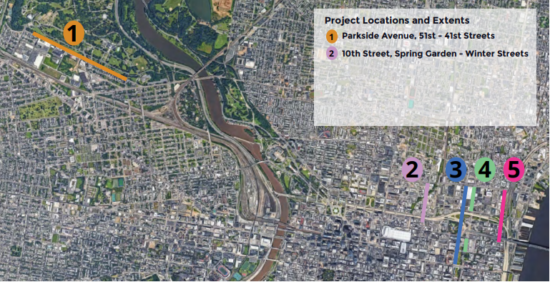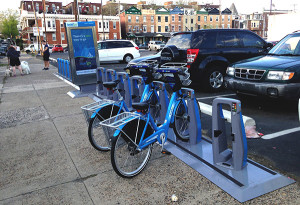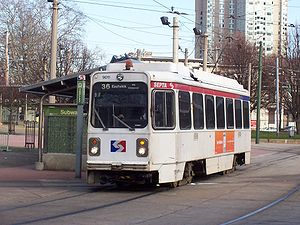April 22, 2021

Construction work will begin on the Safe Spaces for Cycling Project, starting the week of April 26th (weather permitting), according to today’s announcement by Streets Commissioner Carlton Williams.
The project involves the upgrading or reconfiguring bike lanes with the installation of pavement markings, flexible delineator posts, and bike lane related signage.
The following streets in West Philadelphia are included within the scope of this project:
• Parkside Avenue from Girard Ave to 52nd St. Continue Reading
December 18, 2020

The Indego bike station at 44th and Walnut.
Indego, Philly’s bike share program, has announced that it will expand in West Philadelphia and parts of South Philadelphia next year. Indego is planning to install approximately 30 new stations in the city next year, including in the new service area in West Philly, which includes the neighborhoods of Garden Court, Walnut Hill, Cedar Park, and Mill Creek (see map below).
Indego also plans to add more stations to the already existing service area and will introduce 300 electric bikes to its fleet in 2021. Continue Reading
December 10, 2020
The SEPTA Trolley Tunnel that connects West Philadelphia with Center City will be closed every night from 12 a.m. until 5 a.m., beginning Sunday, Dec. 13 until further notice, SEPTA has announced. During the closure hours, SEPTA crews will be working on COVID-19 maintenance, which includes deep cleaning of the stations.
During the overnight tunnel closure, Route 10, 11, 13, 34 and 36 trolleys will be on diversion to 40th and Market streets where riders can transfer for free to or from Market-Frankford Line trains or the overnight MFL Owl buses at the 40th Street Station for travel to/from Center City.
Trolleys will continue to operate on their regular route throughout West and Southwest Philadelphia.
September 15, 2020
In the wake of the tragic death of 25-year-old Avante Reynolds, a pedestrian killed on Cobbs Creek Parkway last month, and the demand for changes from the community, PennDOT and the city’s Streets Department have agreed to carry out safety improvements on the Parkway. The decision was announced today during a meeting with elected officials from West Philadelphia that included State Sen. Anthony Williams, State Rep. Joanna McClinton, and City Councilmember Jamie Gauthier.
PennDOT will begin installing multiple improvements within the next month, including rumble strips along the center lanes along the Parkway from Girard Avenue to Baltimore Avenue. A new style of rumble strip technology will be used which minimizes noise and nuisance to neighboring residents. Continue Reading
September 10, 2020
The Cobbs Creek Community Association and 5th Square have launched a petition demanding a safer Cobbs Creek Parkway, one of the city’s deadliest roadways. The petition is addressed to PennDOT and the Philadelphia Streets Department and demands immediate action to make this road safe for all its users. Continue Reading
July 13, 2020
 The annual SEPTA trolley tunnel repair and maintenance project, “Trolley Tunnel Blitz” has begun. The tunnel will be closed until Monday, July 20 and all trolleys will be on diversion to 40th and Market Streets where passengers can board the Market-Frankford Line to continue their travel to Center City. No additional fare is required when you switch to/from the Market-Frankford Line.
The annual SEPTA trolley tunnel repair and maintenance project, “Trolley Tunnel Blitz” has begun. The tunnel will be closed until Monday, July 20 and all trolleys will be on diversion to 40th and Market Streets where passengers can board the Market-Frankford Line to continue their travel to Center City. No additional fare is required when you switch to/from the Market-Frankford Line.
SEPTA crews will work around the clock during the Blitz to tackle track and power maintenance in the tunnel. This summer the focus will also be on intensive cleaning at all stations.
This is the eight consecutive year SEPTA has held the Trolley Tunnel Blitz. It is usually scheduled during summer months when ridership is traditionally lower.
Regular trolley service through the tunnel is expected to resume at 5 a.m. on Monday, July 20.











Recent Comments